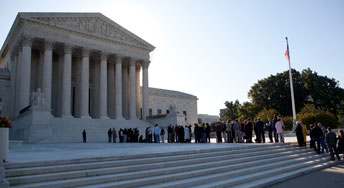Free Abdulelah Shaye Free Abdulelah Shaye
To its shame, the Obama administration continues to defend its role in the case of a jailed Yemeni journalist.
Mar 21, 2012 / Editorial / The Editors

Why the ACLU Is Wrong About ‘Citizens United’ Why the ACLU Is Wrong About ‘Citizens United’
A former ACLU attorney points out that corporate spending on political campaigns is not “free speech” deserving First Amendment protection.
Mar 21, 2012 / Editorial / Burt Neuborne
Despite the History of Brutality, We Must Reform, Not Abandon, the Police Despite the History of Brutality, We Must Reform, Not Abandon, the Police
Only the government can assume the role of policing and protecting Americans.
Mar 21, 2012 / Blog / Bryce Covert
Eggs Are People Too! Eggs Are People Too!
Today's “right to life” rhetoric is a bizarre cross between the theological imperative to be fruitful and multiply and the fetishism of microbiological cellular promise...
Mar 21, 2012 / Column / Patricia J. Williams
Will the Supreme Court Toss Life Without Parole for Juveniles? Will the Supreme Court Toss Life Without Parole for Juveniles?
Some justices hint they might limit mandatory sentences that send teenagers to die in prison.
Mar 21, 2012 / Blog / Liliana Segura
The Patriot Act You Don’t Know About The Patriot Act You Don’t Know About
When the federal government wants some information under Section 215 of the Patriot Act—which allows agents to access “tangible things” like business records—it goes to the Foreign Intelligence Surveillance Court. This much we know. What we don’t know is how broadly FISA interprets Section 215—what information it allows federal agents to access, and to what extent the government must prove “relevance” to a terrorism investigation. Two men who do know, however—Senators Mark Udall and Ron Wyden of the Senate Intelligence Committee—have consistently sounded alarms about what FISA is allowing under Section 215. While unable to reveal specifically what they have learned, the two Senators have repeatedly said that the public would be shocked if it knew what information was being collected with the help of FISA and the Patriot Act. This week, Udall and Wyden wrote to Attorney General Eric Holder asking him to address this issue (emphasis is theirs): We believe most Americans would be stunned to learn the details of how these secret court opinions have interpreted section 215 of the Patriot Act. As we see it, there is now a significant gap between what most Americans think the law allows and what the government secretly claims the law allows. This is a problem, because it is impossible to have an informed public debate about what the law should say when the public doesn't know what its government thinks the law says. The two senators were spurred to write after learning the Justice Department wants to dismiss lawsuits filed by the American Civil Liberties Union and the New York Times that seek to find out exactly how the government is interpreting Section 215. But it’s not the first time they’ve raised the issue, to Holder nor publicly—we’ve flagged it before here, and Wyden gave a dramatic speech on the Senate floor about this last year: Download Video as MP4 In 2009, the administration promised it would establish a process for “reviewing, redacting and releasing significant opinions” of FISA, but as the letter from Udall and Wyden notes, this hasn’t happened once. One has to assume Udall and Wyden are legitimately disturbed by what they know—it’s extremely unusual for two senators to go so public about secret information they are privy to, and especially to prod a president (and former Senate colleague) from their own party. Will we ever know what has alarmed them?
Mar 16, 2012 / Blog / George Zornick
Why Life Without Parole Is Wrong for Juveniles Why Life Without Parole Is Wrong for Juveniles
The Supreme Court has ruled that children should be treated differently from adults. Why do we still sentence them to die behind bars?
Mar 13, 2012 / Randy Hertz
Will the Courts Protect Voting Rights? Will the Courts Protect Voting Rights?
A pair of rulings suggest there is some hope, but not too much, that courts will prevent disenfranchisement.
Los Espías de la Policía de Nueva York Los Espías de la Policía de Nueva York
Fuera de Washington hay bastante la indignación, particularmente en los campus universitarios y en las comunidades afectadas, en donde las revelaciones de espionaje cayeron como un...
Mar 8, 2012 / En español / The Editors

Can Anyone Rein in the NYPD’s Spies? Can Anyone Rein in the NYPD’s Spies?
Outrage over the surveillance of Muslim communities must be channeled into pressure to investigate—and end—the federally funded program.
Mar 7, 2012 / Editorial / The Editors
